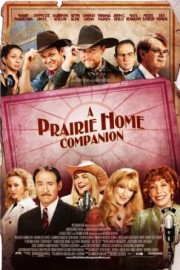A Prairie Home Companion
A delicate blend of joy and sadness comes through Robert Altman’s “A Prairie Home Companion,” a cinematic riff of the 30-plus year old radio variety show hosted by screenwriter/star Garrison Keillor. There’s a passion and life in Altman’s direction that is difficult to match for even the best filmmakers on the one hand, while a deep sense of pain and melancholy glides across the surface as Keillor- as a host known as GK- hosts the (fictional) final broadcast of “A Prairie Home Companion” before a Texas company- who’s sent an ax man (played by Tommy Lee Jones)- bulldozes the show’s own Fitzgerald Theater in St. Paul into a parking lot. The two make wonderful bedfellows, and Companion” a genuine cinematic event. To consider Altman’s passionate direction is to see that the 81-year old filmmaker (who just received an honorary Oscar this year- for a career that includes classics “M.A.S.H.,” “Nashville,” “The Player,” “Short Cuts,” and “Cookie’s Fortune”- and brought the house down with a classic speech) still has something to say onscreen (and the talent to say it well), while the melancholy of Keillor’s perceptive screenplay (one of the year’s best) would make a fitting eulogy to Altman’s career were he to pass away before making another film (here’s hoping not).
The film is vintage Altman in the way multiple storylines intersect to bring together a common narrative theme- in this case, a lamenting of the death of radio as an entertainment medium. (Wonder if Altman feels the way about cinema?) Lucky for us he infuses his film with a collection of rich and endearing personalities, starting with Keillor himself as GK- I’ve never listened to “Companion,” but Keillor’s soothing voice and demeanor as GK (a fictionalized version of himself, granted, but it’s not hard to believe he’s very much like this in real life) makes the prospect sound less hokey than it might have otherwise. As singing cowboys with a penchant for subversive humor, Woody Harrelson and John C. Riley score many of the film’s biggest laughs, including a sung tribute to low-brow wit that’s a must-see in and of itself. Kevin Kline also gets high marks as a private eye handling security for the show (his voiceover and mannerisms in general have just the right hint of subtle knowingness he’s playing a cliche while showing the genuine feeling his character has for the show), as does Virginia Madsen as an almost otherworldly “woman in white” who acts as both the show’s avenging angel and guide to a better place- it’d be a shame to spoil any of the surprises in her character’s existance in the film. But for me, the film boiled down to three actresses- Lili Tomlin and Meryl Streep as singing sisters Rhonda and Yolanda Johnson (they’ve been an act since they were children), and Lindsay Lohan as Yolanda’s daughter Lola. An Altman regular, Tomlin brings her singular personality to Rhonda, and her chemistry with Streep (more on her in a minute) matches beat-for-beat their unforgettable duet of an introduction of Altman at the Oscars this year. After some purely commercial choices, Lohan (“Mean Girls”) rediscovers that breezy charisma and feeling that made people take notice of her in the first place as Lola (who writes suicide poetry, but is more passionate artist than troubled teen); her near-the-end, on-the-spot version of “Frankie and Johnny” is enough to remind someone, “Hey, she’s actually pretty good.” Streep is the deal-maker, though; along with “The Devil Wears Prada,” Streep could be a rare actress to score Oscar nods in both lead and supporting roles in a single year. Of course, with one of the highest Oscar nomination counts of all-time anyway, one already knew the two-time Oscar winner was a rare actress to begin with. But this year, it’s hard to imagine many dramatic turns more memorable than Streep’s bitchy, wickedly funny magazine editor in “Prada” or her light, lovely, and longing country singer in “Companion.” When Streep and Tomlin sing “Goodbye to My Mama” after a fellow cast member on the show passes away, you can hear a pin drop, and need to work to keep the tears from rolling. The emotion behind the performance- and Streep’s Yolanda is very much “Companion’s” beating heart- is what great acting is about, and the easy charms of Altman and Keillor’s film makes great filmmaking not only look easy (it ain’t, people), but go down easy as well. That’s not easy, either.










